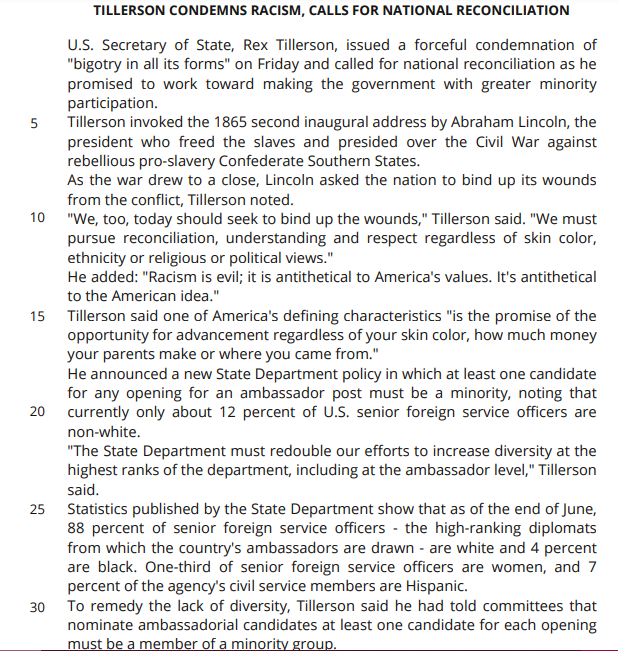Questões de Vestibular
Foram encontradas 254 questões
Resolva questões gratuitamente!
Junte-se a mais de 4 milhões de concurseiros!


Responda a questão de acordo com o texto de Lauren Camera.
Supreme Court Expands Rights for Students with Disabilities
By Lauren Camera, Education Reporter - March 22, 2017. Adaptado.

In a unanimous decision with major implications for students with disabilities, the U.S. Supreme Court ruled Wednesday that schools must provide higher educational standards for children with special needs. Schools must do more than provide a ‘merely more than de minimis’ education for students with disabilities and instead must provide them with an opportunity to make "appropriately ambitious" progress in line with the federal education law.
“When all is said and done,” wrote Chief Justice John G. Roberts, “a student offered an education program providing a ‘merely more than de minimis’ progress from year to year can hardly be said to have been offered an education at all.” He continued, citing a 1982 Supreme Court ruling on special education: “For children with disabilities, receiving an instruction that aims so low would be equivalent to ‘sitting idly... awaiting the time when they were old enough to drop out.’”
There are roughly 6.4 million students with disabilities between ages 3 to 21, representing roughly 13 percent of all students, according to Institute for Education Statistics. Each year 300,000 of those students leave school and just 65 percent of students with disabilities complete high school.
The case which culminated in the Supreme Court decision originated with an autistic boy in Colorado named Endrew. His parents pulled him out of school in 5th grade because they disagreed with his individualized education plan. Under federal law, the Individuals with Disabilities Education Act (IDEA), schools must work with families to develop individualized learning plans for students with disabilities.
While Endrew had been making progress in the public schools, his parents felt his plan for that year simply replicated goals from years past. As a result, they enrolled him in a private school where, they argued, Endrew made academic and social progress.
Seeking tuition reimbursement*, they filed a complaint with the state’s department of education in which they argued that Endrew had been denied a "free appropriate public education". The school district won the suit, and when his parents filed a lawsuit in federal district court, the judge also sided with the school district. In the Supreme Court case, Endrew and his family asked for clarification about the type of education benefits the federal law requires of schools, specifically, whether it requires ‘merely more than de minimis’, or something greater.
“The IDEA demands more,” Roberts wrote in the opinion. “It requires an educational program reasonably calculated to enable a child to make progress appropriate in light of the child’s circumstances.”
*reimbursement – a sum paid to cover money that has been spent or lost.
In:<https://www.usnews.com/news/education-news/articles/2017-03-22/supreme-court-expands-rights-for-students-with-disabilities>


Adaptado de: HOGAN, Linda. Sightings:
The Gray Whales’ Mysterious Journey. Washington,
D.C.: National Geographic, 2002. p. 29-30.

